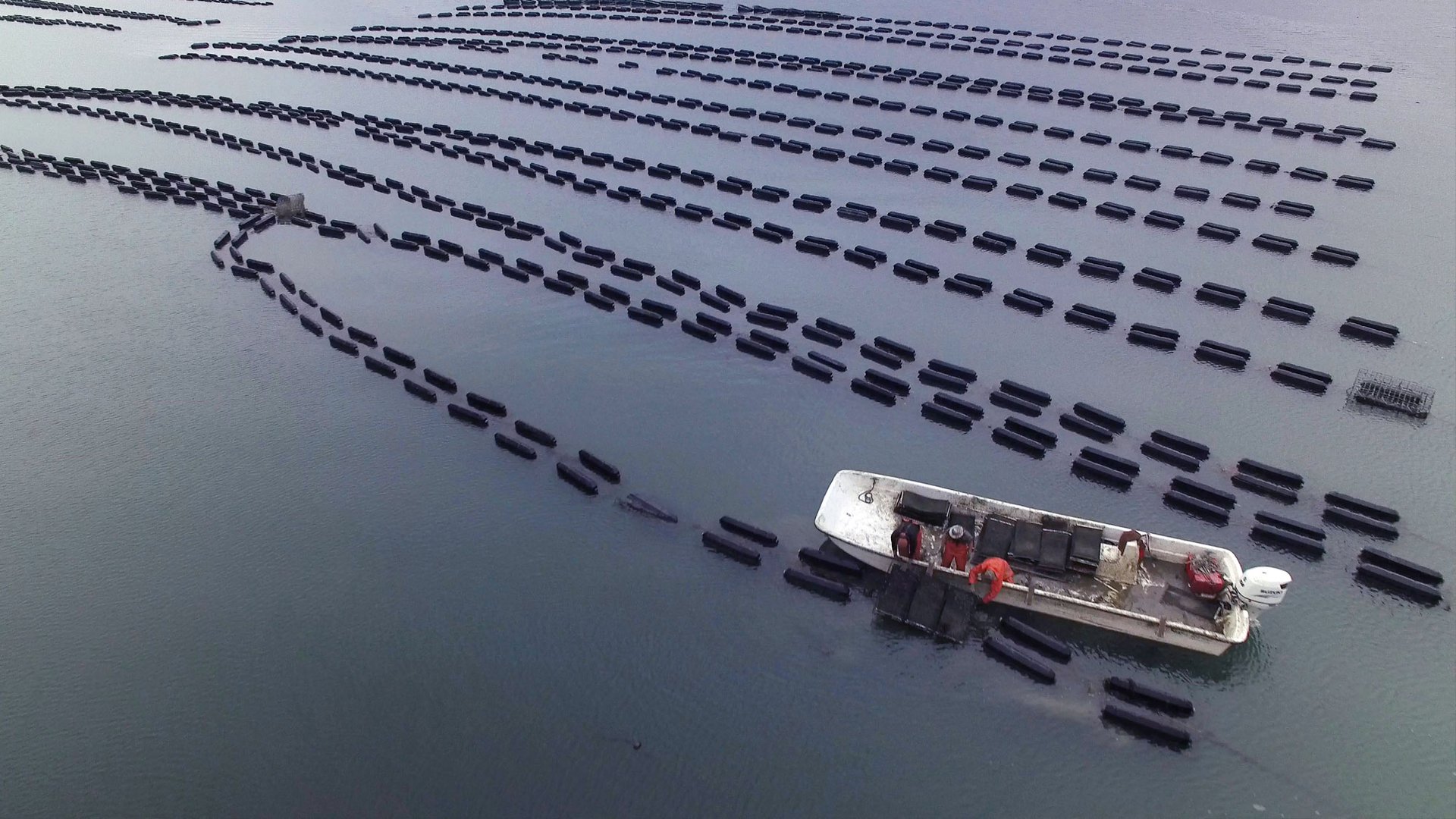Updates on Aquaculture
Perspectives | Dec 31, 2018
by Chris Vonderweidt
Aquaculture Program Manager
2018 was a year of partnerships, progress, and growth for our aquaculture team. We took on local infrastructure projects, state-level growth initiatives, and workforce development efforts that will grow opportunities to work on the water in Maine.

The South Portland Pier Aquaculture & Fishing Industry Needs Assessment
We continued our partnership with the City of South Portland and GEI Consultants in developing a “Master Plan” or long-term vision for the underutilized Portland Street Pier as a commercial fishing and aquaculture hub. Our specific role was to help the city understand who the most likely users of the pier are and how they might use the pier (at present and into the future) by conducting the South Portland Pier Aquaculture & Fishing Industry Needs Assessment. City leadership used our Needs Assessment to select pier design alternatives that would be most beneficial to aquaculture and commercial fishing industries.
Through a combination of data set analysis, surveying, interviews, stakeholder meetings, and informal conversations, the South Portland Pier Aquaculture & Fishing Industry Needs Assessment details the most likely user groups and their operational infrastructure needs in relation to the pier. The report also includes a comprehensive map and description of Portland Harbor’s working waterfront support infrastructure to help city officials understand what services are abundant or lacking. It concludes with a finding that the pier holds potential to support both aquaculture and commercial fishing businesses who share many of the same infrastructure needs.

Read the full report
South Portland Pier Aquaculture & Fishing Needs Assessment
Commercial Oyster Demonstration Farm Partnership
In May, we partnered with the Quahog Bay Conservancy (QBC) on a commercial oyster demonstration farm to generate and outsource the real-world financial data of growing an oyster farm to commercial scale.
Though an abundance of oyster farming support resources are available to Maine sea farmers, detailed financial information about the real-world costs, revenues, profits, and losses of a commercial-scale oyster farm don’t exist. This is critical business planning information for pre-revenue and startup oyster farms, which comprise approximately 40% or more of Maine’s industry. Scaling up and increasing production from tens-of-thousands to hundreds-of-thousands presents significant challenges; these farms are vulnerable to business failure in the coming years. We hope to support these small businesses by open-sourcing financial and operational knowledge generated by the demonstration farm.
In 2015, QBC waded into oyster farming by starting a pre-commercial scale oyster farm in Quahog Bay. Like many of Maine’s startup farms, they had success with oyster farming at a small scale and want to grow to commercial size.
Our efforts in 2018 focused on expanding the existing sea farm from square feet to acres, which gives more room to grow oysters. It was step #1 for us because the size of a sea farm dictates the operational and business plans. Through a collaborative process that included council from Jeff Auger of Mook Sea Farms, the team developed an application for a commercial lease off of Snow Island that was submitted in December. Our 2019 focus will be on developing the operational and business plans, site buildout, tracking growth and production, and documenting the process.
FocusMaine Partnership
GMRI is one of two “backbone” organizations for the FocusMaine aquaculture job creation initiative, which uses a fact-based, disciplined approach to industry development. 2018 marked the first year of full-steam-ahead implementation of growth strategies for GMRI and its partners — the Maine Aquaculture Association and FocusMaine.
Aquaculture Accelerator
Through the FocusMaine partnership, we partnered with the Maine Center for Entrepreneurs (MCE), and Maine Aquaculture Association (MAA) to develop and administer an intensive 15-week aquaculture-themed entrepreneur development program to further our shared goal of creating aquaculture jobs in Maine.
The prototype program – titled Aquaculture Top Gun 2018 – was modeled after MCE’s established Top Gun entrepreneur development program that teaches business fundamentals and provides one-on-one mentoring to early-phase businesses. The focus on early-phase and startup businesses — which represent 40 – 50% of Maine’s sector by number — offered the highest potential for job creation (and preventing business failure).
In fall 2017, the development team met regularly to tailor the Top Gun core curriculum to the unique challenges faced by aquaculture businesses and leverage networks to recruit aquaculture business experts as presenters and mentors. Twelve businesses were selected through a competitive application process and the program ran from February–May 2018. The program culminated with a Shark Tank style “pitch-off” with the two most outstanding presenters — Matt Moretti of Bangs Island Mussels and Jonathan Turcotte of Glidden Point Oyster Farms — each receiving a $5,000 cash prize to invest in business growth.
Read More
Floating the idea of more Maine shellfish, everywhere
As regional and global markets clamor for cold water shellfish, the state's producers look to expand their market base.
Press Herald|Jun 10, 2018
Aquaculture Workforce Development Strategy
Through the FocusMaine partnership, GMRI is leading development of the Maine Aquaculture Workforce Development Strategy. The project involves partnering with a team of consultants from Scotland, Educate Maine, MAA, and a Steering Committee representing 22 of Maine’s education and training institutions to understand how the state’s existing programs can be leveraged to create a comprehensive training pipeline that meets the labor needs of Maine’s growing and evolving industry. The work, slated to begin in late-January 2019 will involve surveying the aquaculture industry to understand their workforce needs, challenges, and experiences; gap analysis of existing training programs; and, drawing from the experiences of countries with developed aquaculture industries through the Scottish consultants, synthesis into the workforce development strategy.




